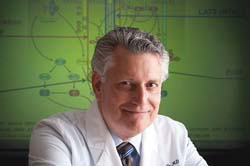
Dr. Dean Metcalfe
Photo courtesy of NIAID
What kind of research do you do and why is it important?
Dr. Metcalfe: As clinical researchers, we choose specific diseases and conditions to study and manage, such as severe asthma, allergies, or a specific research focus; in my case, mast cells, which cause allergic reactions. We look at the mechanisms of disease; how asthma develops, for example. It is a slow and painstaking process.
But by understanding more and more, we can learn how to discover new approaches to therapy, to treating people more effectively. Clinical research is multifaceted, with everyone working together to make patients feel better. That’s always the goal, the most important aspect of what we do.
How big is your research team?
Dr. Metcalfe: We have approximately 55 people, including principal investigators—the independent scientists responsible for specific studies—staff scientists and staff clinicians, fellows in training, research nurses, and technical and administrative support staff. In addition to basic research, we initiate and maintain a dozen or more clinical studies on specific diseases relating to allergy at any one time in the NIH Clinical Center; and we supervise allergy and immunology training for selected pediatric and internal medicine physicians who are specializing in allergic and immunologic diseases.
Give me an example of what you’re talking about.
Dr. Metcalfe: We’ll work with people who have severe, life-threatening allergic reactions to foods or bee stings, for example. These reactions are called anaphylaxis, and people who have it typically carry injectable epinephrine to protect themselves if they eat the wrong food or they’re stung. We’ll bring them in to study their disease with a focus on mast cells.
Mast cells make up approximately 1 percent of the body’s tissues and are believed to play defense against infectious organisms. But when they go wrong, you get allergic reactions. Our goal is to understand why and find out how to better manage, if not cure, the problem.
How much progress has there been?
Dr. Metcalfe: A great deal in my lifetime. I suffered from severe asthma as a child in the 1950s. There were very few medicines to control the symptoms. I would get terribly short of breath and the doctor would have to come to the house and give me a shot to get through the night. Back then, the advice was not to exercise, too. Fortunately, that didn’t make sense to my parents or me, so I did. I have great sympathy for how hard it is for parents to deal with their children’s conditions.
Today, there are many treatments to control asthma symptoms, from steroids to patient-specific action plans, including recommending exercise. Very few people end up in the hospital.
Did your asthma influence your becoming a doctor?
Dr. Metcalfe: Yes. I was impressed with doctors helping me and thought, “I can do this.” I was 10 when I told my parents I was going to be a doctor. But my doctor said, “You can‘t. You have severe asthma.” I didn’t believe him.
What are you working on now?
Dr. Metcalfe: In one asthma study, we are looking at the muscle cells in the body’s airways so that we can devise medicines to make them work properly. And, recently, as part of our allergy training program, we found that a little-used technique for measuring lung function, called impulse oscillometry, could be easier and safer to use in young children than current techniques.
Are there any boundaries to your research?
Dr. Metcalfe: Yes. We have to show that some aspect of a disease or condition, such as the functioning of airway muscle cells or mast cells, must be studied. NIH occupies a unique position in U.S. and world science. Through the Clinical Center, we have ready access to our patients. This leads to faster analysis and opens new paths to improved patient care.
Also, all our research findings are transmitted worldwide. So this means that someone suffering from asthma in India, for example, could benefit almost immediately from the advances we make here. We spend a great deal of time on the phone and the computer answering questions from other doctors, patients and researchers around the world. We have an obligation to get the best science out.
If we advance in a vacuum, no one benefits.
“Today, there are many treatments to control asthma symptoms, from steroids to patient-specific action plans.”
What are the challenges of research?
Dr. Metcalfe: You have to keep up with the technology, certainly. Also, we must remain open to new ideas and incorporate them into our work. For example, the mapping of the human genome has opened up new avenues for exploring and understanding diseases, such as in my area of mast cells. Lastly, researchers must feel we’re making a difference in human suffering.
What are the benefits?
Dr. Metcalfe: We feel very privileged to be at NIH. It’s a rare place that affords this kind of complex, long-term research funded by the American taxpayer. The public wants diseases cured. It is our privilege as researchers to be able to help make a difference, to ease suffering and pain.
In closing, what are your top tips for helping people manage their asthma or other condition?
Dr. Metcalfe: First, learn as much as possible about your disease from reliable sources and by working with your doctors—being very careful about Internet sources. Second, take charge and be active in caring for yourself: take your medicines, don’t smoke, eat a healthy diet, and exercise regularly. Last, speak out in support of medical research, especially that which helps you.
